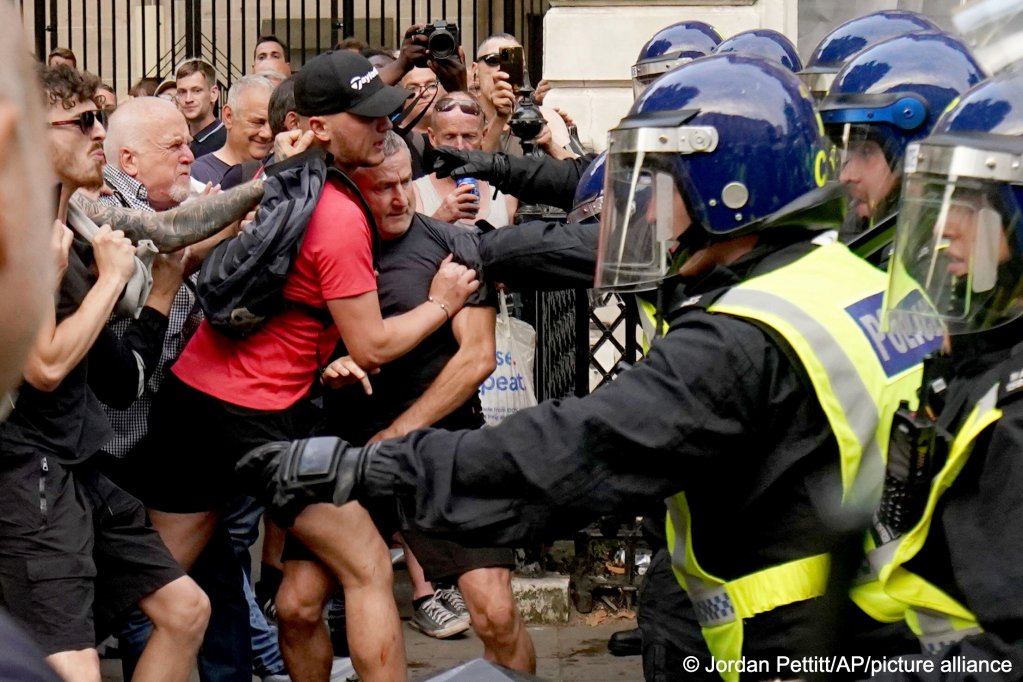A wave of violent riots that broke out in the UK following a knife attack has revealed the far right’s organizing tactics involve nameless, faceless online influencers who peddle conspiracy theories and disinformation.
The posts on social media came with the call to bring England flags and rang with phrases such as "enough is enough", "save our kids" or "stop the boats".
It was enough to bring angry protesters across several English towns to turn violent, throwing flares at Downing Street and clashing with police.
The British national public broadcaster, BBC, analyzed hundreds of social media posts and Telegram groups and concluded that a clear pattern had emerged: the drivers of the protests were largely nameless, faceless online influencers, yet there was no single organizing entity.

In a report published on Friday (August 2), the BBC said, "Attendees at these protests, including those reacting to the Southport attacks, aren't all connected to far-right groups or supportive of rioting. Many are concerned about violent crime or have been misled by misinformation linking the attacks to illegal immigration."
Hundreds have been arrested in connection to the violent protests.
Fatal knife attack sparks outrage
The calls for protest came in the wake of a knife attack last week (July 29) in Southport, northwestern England, that left three young girls dead. The suspect, a 17-year-old male, has been charged with murder.
Far right groups hijacked the incident and used it to spread disinformation about the suspected attacker’s identity and incite violence.
As distinct from 'misinformation', which is false information inadvertently given, disinformation is defined as the deliberate use of wrong information to mislead or spread fear and suspicion.
While it is difficult to pinpoint who initiated the protest calls, the BBC analysis stated that multiple online influencers amplified false claims about the attacker’s identity, which then went viral across a broad audience.
A haven for cultivating hate
According to Hope Not Hate, a UK based NGO, Telegram's minimal moderation policies have made it a space for far-right groups to thrive. In a study conducted over three years from November 2020 to October 2023, Hope Not Hate analyzed 1.7 million conspiracy theory chats in the UK using an advanced deep learning classifier.
The messages were categorized into eight types of hate, three categories of hostility, and one "No hate" category, which comprised over 66 percent of the content. "The presence of hate, though fewer in number, remains significant and concerning," read the report.

The study identified a range of hate sentiments, including antisemitism, anti-Muslim, anti-LGBTQ, and misogynistic content. While only 1 percent of the messages (around 16,500) were classified as violent, 14.4 percent of these were direct threats. This is particularly alarming given recent incidents of violence and terrorism, underscoring the real-world consequences of such online threats.
Other key findings of the report include:
- Conspiracy theory discussions frequently lead to other forms of hatred, with 33 percent of messages showing significant prejudice against minorities
- Migrants are frequently targeted in these chats, where they are blamed for societal problems and linked to far-right conspiracy theories
- A number of messages suggested that violence by governments and elites is a deliberate tactic to control the general population, potentially justifying retaliatory actions.
- The topic of COVID-19 continued to dominate UK conspiracy theory discussions
The report also highlighted the role of prominent far-right figures, including former US President Donald Trump, in fueling these conspiracy theories.
More worried about the future than immigration
While politicians brandish immigration and asylum as polarizing issues, British citizens are much more concerned about the travails of getting by every day.
In a poll commissioned by Hope Not Hate, 64 percent of the 25,000 people surveyed listed the cost-of-living crisis as the most important issue facing them and their family. Concerns regarding the UK’s National Health System (NHS) came second at 47 percent. Immigration and asylum came as the fifth most concerning issue at 18 percent.
Relatedly, results of the poll which was taken in December and January show that 43 percent chose the word "declining" to describe the state of the UK, while 50 percent said that they were pessimistic about the future and thought they would be worse off in their lives than their parents.
While topics such as immigration, gender, and religion dot the UK’s fault lines, the report explained that public attitudes toward immigration are more nuanced than what is often portrayed by politicians and media.
"While many express strong opposition to 'illegal' immigration and criticize the government's policies as weak, a majority oppose the Rwanda deportation plan, believe immigration has benefited Britain, and are worried about reducing the influx of workers in crucial sectors like the NHS and social care."
Meanwhile, when it came to religious issues, there is widespread acknowledgment that Muslims face daily discrimination and unfair media treatment, yet 43 percent of people polled believe Islam poses a serious threat to Western civilization.
The report also said that gender has become a growing fault line in British society, with attitudes between men and women increasingly diverging.
Pandemic brought surge in conspiracy theories
A 2021 study compiled by NGOs across Europe and coordinated by Hope not Hate in the UK, Expo in Sweden, and the Amadeu Antonio Foundation in Germany stated that while the far-right had limited success in exploiting the COVID-19 pandemic, it had nonetheless fueled a surge in conspiracy theories.
"The far-right may operate locally, but it views itself as part of a broader international antidemocratic movement – a disturbing trend that poses a significant and growing threat," read the report.
As people seek explanations for a complex and chaotic world, conspiracy theories have gained traction, ushering in a new era of misinformation.
"If we want to understand the dangers posed by the politics of hatred and division we can no longer just look at our street, our community or even our country, we must think beyond political parties, formal organizations and even national borders," the report concluded.
